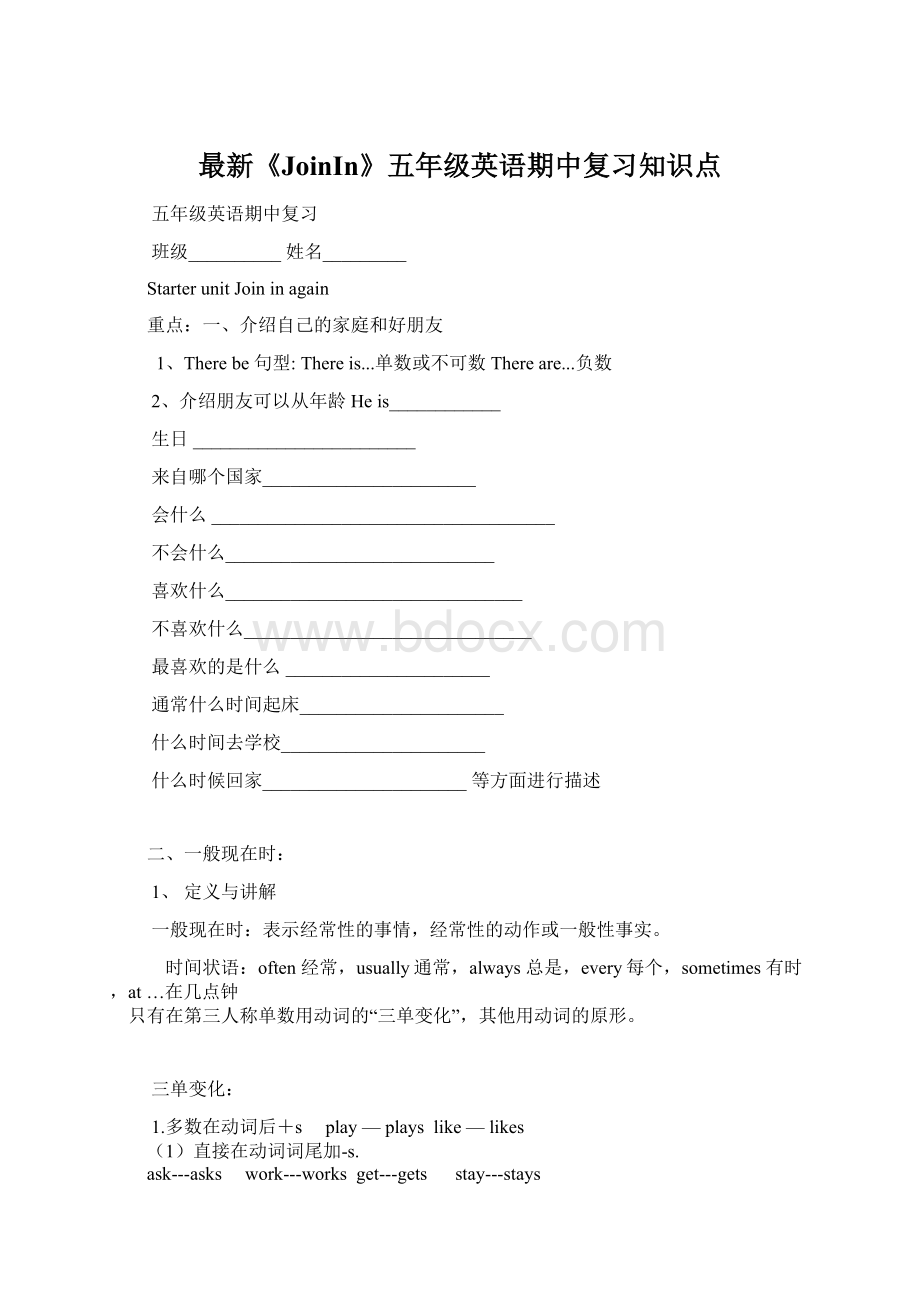最新《JoinIn》五年级英语期中复习知识点.docx
《最新《JoinIn》五年级英语期中复习知识点.docx》由会员分享,可在线阅读,更多相关《最新《JoinIn》五年级英语期中复习知识点.docx(13页珍藏版)》请在冰豆网上搜索。

最新《JoinIn》五年级英语期中复习知识点
五年级英语期中复习
班级__________姓名_________
StarterunitJoininagain
重点:
一、介绍自己的家庭和好朋友
1、Therebe句型:
Thereis...单数或不可数Thereare...负数
2、介绍朋友可以从年龄Heis____________
生日________________________
来自哪个国家_______________________
会什么_____________________________________
不会什么_____________________________
喜欢什么________________________________
不喜欢什么_______________________________
最喜欢的是什么______________________
通常什么时间起床______________________
什么时间去学校______________________
什么时候回家______________________等方面进行描述
二、一般现在时:
1、定义与讲解
一般现在时:
表示经常性的事情,经常性的动作或一般性事实。
时间状语:
often经常,usually通常,always总是,every每个,sometimes有时,at…在几点钟
只有在第三人称单数用动词的“三单变化”,其他用动词的原形。
三单变化:
1.多数在动词后+s play—plays like—likes
(1)直接在动词词尾加-s.
ask---asks work---works get---gets stay---stays
(2)以字母s,x,ch,sh或o结尾的动词,在词尾直接加-es.
watch---watches wish---wishes fix---fixes do---does
go---goes pass---passes
(3)以“辅音字母加-y”结尾的动词,要先变y为i再加-es.
try---tries study---studiescry---cries fly---flies
2.不规则变化:
be----is are have----has
2、一般现在时用法
(1)表示经常性,习惯性,永久性的动作或存在的状态.通常与副词sometimes,often,usually,always,everyday(year,month),once(twice,threetimes)aday,等时间状语连用。
Theyusuallygotoschoolbybike.
Itakethemedicinethreetimesaday.
Shehelpshermotheronceaweek.
Mary’sfatherisapoliceman.
Thereare50studentsinmyclass.
(2)表示客观真理,科学原理,自然现象,等客观事实或格言,谚语等。
Thesunrisesintheeastandsetsinthewesteveryday.
ThemanwhohasneverbeentotheGreatWallisnotarealman.
TomorrowisTuesday.
3、一般现在时的句子转换:
(1)当句子中有be动词或情态动词时,则把be动词或情态动词(can,could等等)提到主语的前面变成疑问句;在be动词或情态动词后面加not变成否定句.
例:
①陈述句:
Sheisastudent.
疑问句→Issheastudent?
否定句→Sheisnotastudent.
②陈述句:
Icanswim.
疑问句→Canyouswim
否定句→Icannotswim.
(2) 当句子中即没有be动词,也没有情态动词时,则在主语前加助动词do(you,以及复数),does(单数she,he,it)变成问句;在主语后谓语动词前加助动词don’t(I,you,以及复数),doesn’t(单数she,he,it)变成否定句,助动词后的动词要变成动词原形。
例:
①陈述句:
Wegetupat7:
00everymorning.
疑问句→Doyougetupat7:
00everymorning?
否定句→Wedon’tgetupat7:
00everymorning.
②陈述句:
Shehasalittlebrother.
疑问句→Doesshehavealittlebrother?
否定句→Shedoesn’thavealittlebrother.
4、习题巩固
(一).用动词的适当形式填空
1.She_________(go)toschoolatseveno’clock.
2.It’s6 o’clock.Theyare_________(eat)supper.
3.Heusually___________upat17:
00.(get)
4.She___________(live)inBeijing.
5.Amy_________(be)herejustnow.
6._______(be)thereafly onthetablejustnow?
7.Myfather__________(watch)TVeveryevening.
8.Myfather_______________(make)toysthesedays.
9.?
________Amy_________(read)Englisheveryday
10.ChenJiesometimes_________(go)totheparkwithhersister.
(二).选择填空
1.Iwant____homeworknow.A.doing B.todo C.todomy D.domy
2.It'stime______.
A.gotoschool B.playgames C.togohome D.todomyhomeworks
3.______goandhelpher. A.Let'sme B.Let'sus C.Let's D.Let'sto
4.Dotheyhaveanewcar?
Yes,_____.
A.theyare B.theyhave C.theydon't D.theydo
5.Heoften_________supperat6:
00intheevening.
A.have B.has c.ishaving D.iseating
6.We_____________anyChineseclassesonFriday.
A.arehaving B.aren’thaving C.don’thave D.arehave
(三)、用括号内动词的适当形式填空。
1.Heoften_________(have)dinnerathome.
2.DanielandTommy_________(be)inClassOne.
3.We_________(notwatch)TVonMonday.
4.Nick_________(notgo)tothezooonSunday.
5.they_________(like)theWorldCup?
6.Whattheyoften_________(do)onSaturdays?
7.yourparents_________(read)newspaperseveryday?
8.Thegirl_________(teach)usEnglishonSundays.
9.SheandI_________(take)awalktogethereveryevening.
10.There_________(be)somewaterinthebottle.
11.Mike_________(like)cooking.
12.They_________(have)thesamehobby.
13.Myaunt_________(look)afterherbabycarefully.
14.Youalways_________(do)yourhomeworkwell.
15.I_________(be)ill.I’mstayinginbed.
16.She_________(go)toschoolfromMondaytoFriday.
17.LiuTao_________(do)notlikePE.
18.Thechildoften_________(watch)TVintheevening.
19.WangKaiandWangli_________(have)eightlessonsthisterm.
20.-Whatday_________(be)ittoday?
-It’sSaturday.
21. Weoften___________(play)intheplaygound.
22. He_________(get)upatsixo’clock.
23.__________you_________(brush)yourteetheverymorning.
24.What__________(do)heusually (do)afterschool?
25.Danny__________(study)English,Chinese,Maths,ScienceandArtanschool.
26.Mikesometimes__________(go)totheparkwithhissister.
27.Ateightatnight,she__________(watch)TVwithhisparents.
28.________Mike________(read)Englisheveryday?
29.Howmanylessons_________yourclassmate________(have)onMonday?
30.Whattime_________hismother_________(do)thehousework?
(四)写句子
1.Doyouoftenplayfootballafterschool?
(肯定回答)
______________________
2.Ihavemanybooks. (改为否定句)
_______________________________
3.GaoShan’ssisterlikesplayingtabletennis(改为否定句)
_______________________________
4.ShelivesinasmalltownnearNewYork. (改为一般疑问句)
_______________________________
5.IwatchTVeveryday.(改为一般疑问句)
_______________________________
6.Davidhasgotagoal.(改为一般疑问句)
_______________________________
7.Wehavefourlessons.(否定句)
_______________________________
8.Nancydoesn’trunfast(肯定句)
_______________________________
9.Mydogrunsfast.否定句:
_______________________________
Unit1Aphonecall
一、重点单词
askmobilephonebeforeillwrongwebsitefilmgetmessagephotocollect
二、重点短语:
1、waitamoment=waitaminute
2、havegot“有”,与have用法相同。
注意:
havegot变一般疑问句时只用将have提到主语前,而have变一般疑问句时应借助助动词do.
如:
Ihavegotabook.——Haveyougotabook?
Ihaveabook.——Doyouhaveabook?
3、Whatisitabout?
它是关于什么的?
about:
“关于;有关”
4、haveto:
不得不
5、overthere:
6、hurryup:
快点
如:
Hurryup,oryouwillbelate.
7、Whoisspeaking?
你是谁,此句为打电话的常用语,用来询问对方是谁。
8、Hey,isthatMike?
此句为打电话常用语,用来询问对方是谁吗?
注意:
打电话是要询问对方是某人时,不能用Areyou...?
如要表示自己是谁,应用Thisis...
而不能说Iam...
9、Hereyouare.给你。
用于递给某人东西时使用。
10、whatcanIdo?
我能做什么呢?
11、Canyouhelpme?
你能帮我吗?
常用来向别人寻求帮助时。
12、Heretheyare.他们在这。
此句为倒装句,用来强调地方“Here”。
如:
Thereheis.
13、populara流行的
常用搭配:
bepopularwith受.......欢迎
如:
Mobilephonesareverypopularwithstudents.
14、writeemails:
写邮件writeletters:
写信
15、favourite最喜欢的
如:
Itismyfavouritebook.=Ilikethebookbest.
16、watchTVprogrammes看电视节目
17、doshopping:
购物
三、重点句型
1、在用英语打电话时,通常用this表示“我”,用that表示“你”,如:
-Hello, may I speak to Mary?
你好,可以让玛丽接电话吗?
-This is Mary speaking.
我是玛丽。
-Hello!
This is Peter. Who’s that?
你好,我是彼得。
你是谁?
-This is Ben.
2、Myfathercollectsstamps.
第三人称单数he、she、it之后接的动词会相应变化,如常见的havegot改为hasgot,like改为likes,do改为does,go改为goes.
-Whatcanyoudowithamobilephone?
-Icansendandgetmessages.(我可以发送和接收短信)
情态动词can用来描述自己的能力,其后接动词原形。
如:
Icansing.Shecandance.Hecanflyakite.
备注:
教材P12第4部分的短文以及对话必须会背会默!
P8第1a部分和P9第2a部分熟读!
Unit2LifeintheArctic
一、词汇对译
北极熊兔子湖早期地爷爷奶奶
海报雪小山冰拉抓无聊的
catchaharejumpinthewaterswimacrossalake
walkthroughthesnowrunupthehill
二、重点短语
1、gototheArctic去北极如:
gotoschool
2、across“穿过”指从物体表面穿过。
与through意思相同,但through指从物体中间穿过
如:
walkthroughtheforest穿过森林walkacrosstheroad穿过马路
3、wanttodo...“想要做.....”
4、show“展示”常用结构:
showsbsth;showsthtosb
句型
1、It’salwaysdark.
2、WhereistheArctic?
Where“哪里”用来询问地点
3、What’soverthere?
用来询问远处的某物是什么。
回答可用:
Itis+....也可省略Itis
直接做答
4、What’shedoingoverthere?
此句为现在进行时的特殊疑问句,常用来询问某人正在做什么,回答也应该用现在进行时。
如:
He’ssinging.
5、Doyoulike……?
6、WhatcanIdo?
It’salwaysdark.
7、Wasn’titboring?
难道不无聊吗?
词句为反问句,常希望得到别人的肯定答复。
8、Whatwillyoudoingtomorrow?
I’llgoswimming.
三、语法:
一般将来时
概念:
表示将要发生的动作或存在的状态及打算、计划或准备做某事。
句中一般有以下时间状语:
tomorrow,nextday(week,month,year…),soon,thedayaftertomorrow(后天)等。
基本结构
①begoingto+do
②will+do
如:
Iamgoingtohaveapicnictomorrow.
Thechildrenaregoingtohaveasportsmeetingnextweek.
Tomwill/isgoingtoseeaplaywithhisfatherthisevening.
否定句
在be动词(am,is,are)后加not或情态动词will后加not或直接用won’t。
Iamnotgoingtohaveapicnictomorrow.
Thechildrenarenotgoingtohaveasportsmeetingnextweek.
Tomwill/isnotgoingtoseeaplaywithhisfatherthisevening.
★肯定回答及否定回答
Yes,Iwill./No,Iwillnot.
Yes,theywill./No,theywillnot.
Yes,hewill./No,hewillnot.
★变疑问句将助动词移到句首
Areyougoingtohaveapicnictomorrow?
Arethechildrengoingtohaveasportsmeetingnextweek?
WillTomseeaplaywithhisfatherthisevening?
★特殊疑问句
Whatwillyoudo?
习题巩固
一、用单词的适当形式填空。
1. I _______ ________ _______ _______ (see) a film tomorrow.
2. A:
What _______ you _______ ______ _______ (do) next Saturday?
B:
I _______ __________ _______ ________(swim) with my .
3. There ______ _______ (be) a party in our school.
4. Mike _______ ________ (visit ) his grandparents next week.
5. He ______ ______ ______ _______(buy)a the day after .
6. ________ (fly)a kite with my father next week.
7. He will not _________ (go) school tomorrow.
二、选择题
( ) 1. There __________ a meeting tomorrow afternoon.
A. will be going to B. will going to be
C. is going to be D. will go to be
( ) 2. Charlie ________ here next month.
A. isn’t working B. doesn’t working
C. isn’t going to working D. won’t work
( ) 3. He ________ very busy this week, he ________ free next
week.
A